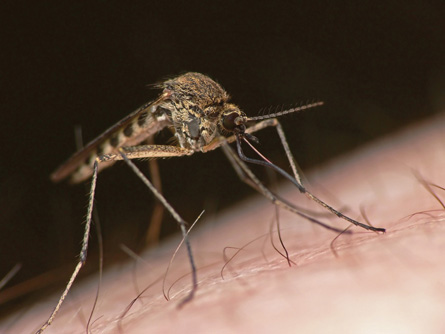Module 7
1. Module 7
1.13. Lesson 4
Module 7—Molecular Genetics: DNA, RNA, and Protein Synthesis
Lesson 4—Changes in the Genetic Code
 Get Focused
Get Focused

© errni/shutterstock
Do genetic superheroes exist? It depends on your definition of “superhero.” On the African subcontinent, communities are ravaged by malaria. The genetic makeup of subcontinental African communities is changing. The frequency of alleles involved in sickle cell anemia is changing. However, the genetic makeup in descendants of those communities who migrated to areas without malaria, such as North America, isn’t changing. The frequency of alleles involved in sickle cell anemia is stable.
In Africa, people with one copy of the sickle cell gene (heterozygous condition) can survive malaria. These individuals are stronger, live longer, and pass the gene to their children. In Africa, the gene for sickle cell anemia is increasing in frequency in the population’s gene pool. In areas without malaria, there is no adaptive advantage in the heterozygous condition. In these communities, the gene for sickle cell anemia is stable in its frequency in the population’s gene pool.
Are the people in subcontinental Africa “superheroes”? Does this mean that communities without malaria can’t be superheroes?
gene pool: the total of all the alleles of all genes in the individuals in a population
adaptive advantage: a difference in structure, physiology, or behaviour that gives an organism a better chance of survival
In this lesson we will explore how random changes (mutations) can be a source of genetic variation in a population. Sometimes these variations can be adaptive and can give the organism a competitive advantage.
This lesson will address the following focusing questions:
- What kinds of changes in DNA can result in variation?
- How can mutations in DNA have both a positive and a negative result?
- What are the causes of changes in DNA?
 Module 7: Lesson 4 Assignment
Module 7: Lesson 4 Assignment
Your teacher-marked Module 7: Lesson 4 Assignment requires you to submit a response to the following for assessment:
- “Thought Lab 18.3: Investigating Cancer Genes” on page 646 of your textbook
- research a mutagen
This two-part assignment addresses the causes of mutation.
Download a copy of the Module 7: Lesson 4 Assignment to your computer now. You will receive further instructions about how to complete this assignment later in the lesson.
You must decide what to do with the questions that are not marked by the teacher.
Remember that these questions provide you with the practice and feedback that you need to successfully complete this course. You should respond to all of the questions and place those answers in your course folder.
Remember that you also have the option of trying additional questions from the textbook for further practice. Consult with your teacher for the answers to these questions. The Key will also provide you with many Diploma Exam-style multiple-choice, numerical-response, and written-response questions that will be an excellent review of the module. Practising your responses to these types of questions is good preparation for the Diploma Exam.